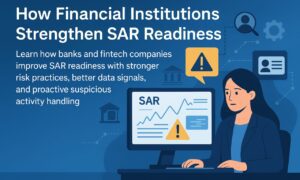Compliance management has become a critical pillar for sustainable operations. The complexities of modern-day regulations are challenging. Financial institutions constantly grapple with stringent compliance requirements set by regulatory bodies. Not meeting these requirements can lead to hefty fines, legal battles, and a tarnished reputation. As a result, businesses are turning towards innovative compliance management solutions, driven by advanced technology, to mitigate risks and ensure smooth operations.
The Transforming Space of Compliance Management
Compliance management in financial services involves adhering to a myriad of laws, standards, and regulations. Regulatory bodies like the Financial Conduct Authority (FCA) and the Securities and Exchange Commission (SEC) constantly update these rules, making it tough for organizations to stay compliant. Additionally, the increasing global nature of financial operations adds layers of complexity.
Traditional compliance methods, heavily reliant on manual processes, are proving to be inefficient and error-prone. Paper-based tracking and manual audits often lead to mistakes, which can be costly for financial institutions. With increased scrutiny and regulations, tech-driven compliance solutions are now essential.
The Role of Technology in Compliance Management
Technological advancements are revolutionizing how financial institutions manage compliance. From artificial intelligence (AI) and machine learning (ML) to blockchain and data analytics, various technologies are aiding in the efficient management of compliance. Here are some of the primary ways in which technology is transforming compliance:
Automation of Compliance Processes
One of the significant challenges in compliance is handling the vast amount of data and documentation required. Automation helps in simplifying these tasks by reducing manual intervention. Automated compliance software can efficiently handle data collection, reporting, and monitoring, thereby reducing the risks of human errors.
For example, Robotic Process Automation (RPA) is being used to streamline repetitive tasks. By automating data entry and regulatory reporting, RPA allows compliance officers to focus on more strategic activities. This, in turn, increases productivity and enhances compliance accuracy.
Artificial Intelligence and Machine Learning in Compliance
AI and ML are playing a pivotal role in compliance management solutions. They enable financial institutions to analyze massive datasets and identify potential risks. AI algorithms can spot anomalies and flag suspicious activities that may go unnoticed by human oversight.
Machine learning models, on the other hand, can learn from historical data. They predict potential compliance risks and suggest preventive measures, making it easier for financial firms to proactively manage issues. AI also supports real-time compliance monitoring, offering instant alerts when irregular activities are detected.
Blockchain Technology for Secure Transactions
Blockchain technology is another game-changer in the compliance arena. It offers a transparent and immutable ledger system, which is perfect for maintaining compliance records. Financial institutions can leverage blockchain to ensure secure and verifiable transactions. The decentralized nature of blockchain makes it nearly impossible to alter recorded data, thus enhancing trust and security.
Moreover, smart contracts on blockchain platforms can automate compliance tasks. For example, when specific regulatory conditions are met, the smart contract can automatically execute certain actions, like triggering alerts or processing payments, reducing the need for manual compliance checks.
RegTech Solutions for Enhanced Compliance
RegTech, short for Regulatory Technology, specifically focuses on helping financial institutions manage regulatory processes. These solutions use cloud computing, big data, and AI to help businesses comply with regulations efficiently. RegTech tools offer features like risk analysis, compliance monitoring, and reporting, all in one platform.
Financial firms are increasingly adopting RegTech solutions to streamline compliance processes and minimize risks. These tools help in reducing the time spent on compliance tasks, allowing institutions to save costs and allocate resources more effectively.
Benefits of Using Tech-Driven Compliance Management Solutions
The use of technology in compliance management offers numerous advantages for financial institutions. Here are some key benefits:
Improved Accuracy and Efficiency
Automated compliance systems reduce the chances of human error, ensuring more accurate and reliable compliance processes. They enable faster data processing and report generation, making it easier for institutions to stay up-to-date with regulatory requirements.
Cost Savings
Compliance processes can be expensive, especially when done manually. Investing in tech-driven solutions reduces the need for a large compliance team and lowers operational costs. Moreover, automated systems can help in identifying and mitigating risks early, preventing costly legal issues and fines.
Real-Time Monitoring and Reporting
Traditional compliance methods often involve periodic checks, which may not be sufficient in today’s fast-paced financial environment. With technology, financial institutions can monitor compliance in real time. Real-time data analytics provide immediate insights, helping businesses to respond quickly to potential issues.
Enhanced Risk Management
With AI and machine learning, institutions can better anticipate risks and prepare accordingly. Predictive analytics help in forecasting potential compliance breaches, allowing firms to implement corrective measures proactively.
Streamlined Regulatory Updates
Keeping track of frequent regulatory changes is a daunting task. Automated compliance management systems can be updated with the latest regulations, ensuring that financial institutions are always aligned with current requirements. This helps in avoiding penalties and staying compliant with ease.
Challenges in Implementing Compliance Management Solutions
Despite the many benefits, implementing tech-driven compliance solutions does come with its own set of challenges. Financial institutions need to carefully consider these aspects:
Data Privacy Concerns
Compliance solutions often require access to vast amounts of sensitive data. Ensuring data privacy and protection is paramount. Financial institutions must implement robust cybersecurity measures to prevent data breaches and maintain customer trust.
2. Integration with Legacy Systems
Many financial institutions still operate on outdated legacy systems. Integrating new compliance technology with these systems can be challenging. It may require significant time and resources to upgrade and ensure compatibility, which can slow down the implementation process.
High Initial Costs
While tech-driven solutions can save money in the long run, the initial investment can be substantial. Financial institutions need to weigh the costs against the potential benefits to determine if it’s a worthwhile investment.
Regulatory Uncertainty
Regulations are constantly evolving, and it can be tough for technology solutions to keep up. Financial institutions need to work closely with technology providers to ensure their compliance tools are updated in line with the latest regulatory changes.
Future Trends in Compliance Management Solutions
As technology continues to advance, the future of compliance management looks promising. Here are some trends to watch out for:
Greater Adoption of AI and Predictive Analytics
AI and predictive analytics will become even more integral in compliance management. As machine learning algorithms get better at analyzing data, financial institutions will be able to identify risks and compliance gaps more accurately and faster.
Expansion of Blockchain Use
The use of blockchain in compliance management is expected to grow. Its ability to provide a transparent and secure record-keeping system makes it ideal for regulatory reporting and audits. More financial institutions are likely to adopt blockchain for its enhanced security and efficiency.
Rise of Cloud-Based Compliance Solutions
Cloud computing offers scalable and cost-effective compliance solutions. Cloud-based compliance tools can be easily updated with the latest regulations, making them a popular choice for financial firms looking for flexible and reliable solutions.
Conclusion
Compliance management is a complex and ever-evolving challenge for financial institutions. However, by embracing technology, businesses can streamline their compliance processes, reduce risks, and improve efficiency. From AI and blockchain to RegTech solutions, technology is transforming compliance management for the better. While there are challenges in implementation, the benefits far outweigh the drawbacks. By leveraging the right tech-driven compliance tools, financial institutions can not only meet regulatory requirements but also gain a competitive edge in the market.



































